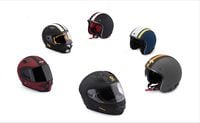If you’ve never heard of Quin Helmets, you’re not alone. Quin is a brand-new company out of Plymouth, Minnesota, just getting its Kickstarter campaign off the ground with its line of smart helmets. Setting itself apart from other helmets with geek-approved hands-free features, Quin is relying on those 0s and 1s to actually keep motorcyclists safer. Quin helmets have integrated Bluetooth 4.0 connectivity to control music, map navigation, and phone calls, but also a built-in crash detection system and SOS beacon. It beats duct taping a Spot Tracker to the top of your lid. When sensors inside the helmet read a force greater than 100 Gs, the software interprets it as a crash, automatically sending out an SOS signal and GPS location to preset emergency contacts or first responders. Riders can also manually trigger the SOS signal in case of any emergency.
The system works in conjunction with the Quin app (1.0), which the company says will be continually updated to include additional features such as ride analytics and “biker-specific traffic information.” Quin’s objective is to keep the app tailored to the needs of motorcyclists and prioritize safety. The system allows users to access their other favorite apps for music, maps, calls, and their smartphone’s personal assistant.
After executing the perfect series of corners, no motorcyclist has ever said, "Boy, I really wish I could tell Siri how much fun I'm having," but there you go. Let's be honest, we talk to ourselves in our helmets anyway, so maybe having an AI companion isn't that weird. I mean, it works for Iron Man.
Quin currently has three models ready for mass production: the open-face McQ (I wonder who that’s named after?) with integrated flip-down dark visor; the Spitfire, a full-face sport-touring model with integrated flip-down dark visor; and the Ghost, a carbon-fiber lid that Quin claims is the lightest smart helmet on the market, weighing a claimed 1,270 grams (2.8 pounds), lighter than AGV’s Pista GP R flagship carbon race helmet.
The McQ and Spitfire feature thermoplastic shell construction and have DOT and ECE certifications. The Ghost has an ECE certification and meets “FIM and AMA racing standards.”
A lot of riders, myself included, are understandably loathe to trust our noggins to upstart helmet makers, even when they are manufactured in the same facility (in China) as many other more familiar brands. It's not uncommon to hear riders profess, "I'm a Shoei man," or "I'm an Arai woman." The value a lot of riders place on head protection can engender brand/construction devotion that can be borderline zealous. Thus, new helmet makers have a hill to climb when it comes to brand perception and acceptance.
Still, the helmet space hasn’t seen a lot of innovation in the past decade or more, so it’s always good to see some new blood thinking outside of the box. Whether or not listening to music and chatting on the phone adds to the motorcycling experience, having an automatic emergency beacon as part of the rider’s daily kit seems like a no-brainer.
USD Pricing:
- McQ: $200 on Kickstarter ($300 retail)
- SpitFire: $235 on Kickstarter ($350 retail)
- Ghost: $375 on Kickstarter ($540 retail)
Mass production is expected to begin in May. For more information, check out quintessential.design.















/cloudfront-us-east-1.images.arcpublishing.com/octane/2WF3SCE3NFBQXLDNJM7KMXA45E.jpg)
/cloudfront-us-east-1.images.arcpublishing.com/octane/G4MG6OUCJNBSHIS2MVVOTPX65E.jpg)
/cloudfront-us-east-1.images.arcpublishing.com/octane/IIGGWFOTOJGB7DB6DGBXCCMTDY.jpg)
/cloudfront-us-east-1.images.arcpublishing.com/octane/QSTCM6AVEZA5JJBUXNIQ3DSOF4.jpg)
/cloudfront-us-east-1.images.arcpublishing.com/octane/U4I7G625B5DMLF2DVIJDFZVV6M.jpg)
/cloudfront-us-east-1.images.arcpublishing.com/octane/B6XD6LS6IVCQPIU6HXDJSM3FHY.jpg)
/cloudfront-us-east-1.images.arcpublishing.com/octane/ICL63FEDDRDTTMINYICCEYGMDA.jpg)
/cloudfront-us-east-1.images.arcpublishing.com/octane/FCGZHQXRBZFLBAPC5SDIQLVF4I.jpg)
/cloudfront-us-east-1.images.arcpublishing.com/octane/WNOB6LDOIFFHJKPSVIWDYUGOPM.jpg)

/cloudfront-us-east-1.images.arcpublishing.com/octane/X33NU3E525ECRHXLNUJN2FTRKI.jpg)
/cloudfront-us-east-1.images.arcpublishing.com/octane/6KKT5NNL2JAVBOXMZYS5ZO76YA.jpg)
/cloudfront-us-east-1.images.arcpublishing.com/octane/J5RKG5O455GMPGQRF2OG6LRT7A.jpg)
/cloudfront-us-east-1.images.arcpublishing.com/octane/GX2CIZKQVRH2TATDM26KFG2DAE.jpg)
/cloudfront-us-east-1.images.arcpublishing.com/octane/ZWIDYSAKQZHD5BHREMQILXJCGM.jpg)
/cloudfront-us-east-1.images.arcpublishing.com/octane/CYUHJZCTSJCH3MRAQEIKXK7SCQ.jpg)
/cloudfront-us-east-1.images.arcpublishing.com/octane/LKOFINY56FCXJCANJ5M7ZDQUBY.jpg)
/cloudfront-us-east-1.images.arcpublishing.com/octane/4NBPDACMWJH63JQYJVK3QRBDZI.jpg)
/cloudfront-us-east-1.images.arcpublishing.com/octane/KKHQHRR3FJGX7H2IPU6RALMWG4.jpg)

/cloudfront-us-east-1.images.arcpublishing.com/octane/5IOFS5JAE5FOXMNA23ZRAVVYUU.jpg)
/cloudfront-us-east-1.images.arcpublishing.com/octane/CGXQ3O2VVJF7PGTYR3QICTLDLM.jpg)

/cloudfront-us-east-1.images.arcpublishing.com/octane/OQVCJOABCFC5NBEF2KIGRCV3XA.jpg)